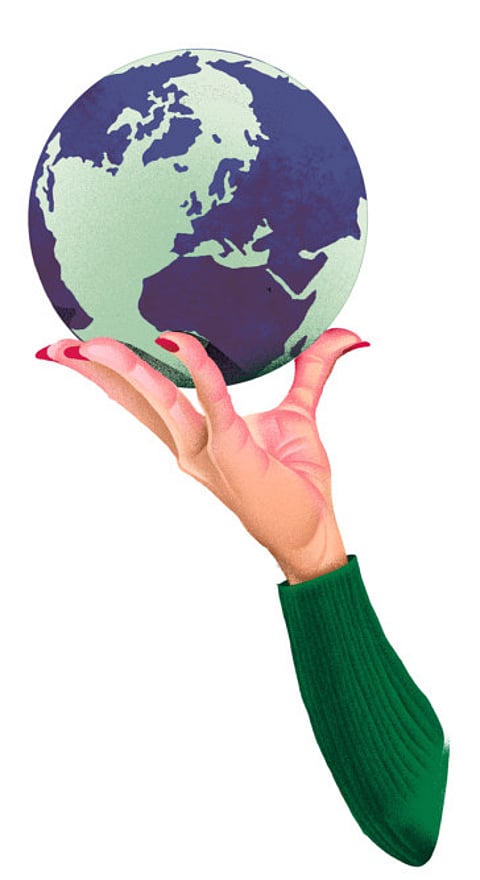Women are equal partners in peace and security
UN Resolution 1325 holds out a promise to women that their rights will be protected

When we think about armed conflicts, what comes to mind are military men, defence weapons, and destruction. Similarly, when we think of conflict and peacekeeping missions, we envision men shaking hands and men in blue helmets, ceasefire, and the protection of civilians.
Despite comprising half the world’s population, women, as well as their contributions, have historically been left out of the peace and security process. Looking at the period between 1992-2011, the World Economic Forum documents that women represented only 4% of signatories to peace agreements and only 9% of negotiators.
When peacekeeping missions take place in post-conflict-torn countries, women and girls suffer the most from displacement, a lack of medicine and food, and life-threatening situations. Therefore, the inclusion of women in peacekeeping missions is vital to establish communication with the local community of women and girls, especially in environments where women cannot speak to men due to conservatism or a fear of foreign troops.
Therefore, women’s roles are a crucial part of trust-building and starting the dialogues necessary to connect and assist communities in need. One of the men in a displaced area once said, “We speak to women as we know that they are here to make peace, not war.”
Women are vital actors and contributors in the decision-making process across all levels of conflict prevention, resolution, and peacebuilding. Further, they are instrumental to the completion of war and the attainment of lasting peace and security

This year, the United Nations Security Council celebrates 20 years since the historic Resolution 1325 adaptation, which advocated for a cohesive approach toward the gender perspective in Peace and Security. Resolution 1325 is considered an “inspirational milestone” for the Security Council and the manifestation of the United Nations’ priorities.
The resolution is also considered one of the most celebrated achievements architectured by civil society, policymakers, and diplomats. Former UN Secretary General Kofi Annan was one of the primary advocates for women’s inclusion in peace and security. He famously noted, “Resolution 1325 holds out a promise to women across the globe that their rights will be protected and that barriers to their equal participation and full involvement in the maintenance and promotion of sustainable peace will be removed. We must uphold this promise.”
Ensuring a lasting peace
Resolution 1325 urges the member states to increase women’s participation across the Security Council, focusing on three main pillars: prevention, protection, and participation of conflicts. It also urged parties in armed conflicts to protect women and girls from violence during war and also engage them in negotiations to ensure a lasting peace.
As per the United Nations, it is 20% more likely to achieve peace post-conflict for over two years when women participate in peace negotiations. Thus, engaging women in the process is strategic to the construction of long-lasting peace. This resolution resulted from high-level advocacy, driven by NGOs and civil society, and resulted in a two-day debate at the security council which was for the first time dedicated to women.
Also Read: A critical turning point for the UN at 75
Also Read: How diplomacy can help in economic recovery
Since October 2000, when the United Nations Security Council adopted Resolution 1325, countries have increasingly incorporated Women, Peace, and Security agendas. From 1998 to 2000, less than 5% of resolutions mentioned women, girls, or gender. However, from 2000 to 2010, over 45% of monitored resolutions referenced women and gender.
In light of Resolution 1325, in 2019, the United Arab Emirates government took the lead in supporting its progress by launching a training program sponsored by Khawla bint Al Azwar Military School in Abu Dhabi to build women’s capacity in the military and peacekeeping sectors.
Starting with 134 Arab women in 2019, the program expanded to include 223 women from Africa, Asia and Arab countries in January 2020. The efforts demonstrated strong commitment and support by the UAE government, which resulted in renaming the Women Peace and Security Training Programme the “Sheikha Fatima bint Mubarak Women Peace and Security Initiative”.
Countries and regional actors must reduce the gap between the ambitions of the resolution and on ground implementation. Women are vital actors and contributors in the decision-making process across all levels of conflict prevention, resolution, and peacebuilding. Further, they are instrumental to the completion of war and the attainment of lasting peace and security.
Ruqayya Alblooshi is an Emirati columnist and researcher in the field International Relations







